TK Arun
India winning 10 every decade would be a true marker of development and freedom

Get Olympian about knowledge
India should set a goal of winning at least 10 Nobel Prizes every decade. Viewing development as raising per-capita income — which is the current obsession of government policy, think tanks, business associations and others — isn’t just sterile, but also betrayal of what is sound in India’s own tradition, when it comes to thinking on life’s attainment.
Kama, Artha, Dharma and Moksha have long been held to be the four basic goals of human life in this land. Artha, or wealth, consumes official thinking. The popular imagination is suffused with Kama (desire, in all its shades), besides Artha. Dharma — ethical, moral conduct that fulfils one’s duty towards oneself and society — and Moksha, or redemption, are hard to define and get a fix on, leave alone quantify. And, in modern management culture, if you can’t measure it, you can’t achieve it, and it’s best cast aside, for measurable things like profits and unicorns.
People with a reflective bent of mind have tried to deal with these fuzzy concepts, nevertheless. Not just ancient ones with their eightfold paths, or alternative yogas of karma, bhakti, jnana or rajas, but all through history. The bards of Bhakti yearned for attaining oneness with the divine. So did the Sufi saints, with a difference of terminology.
India’s first prime minister articulated his understanding of the nation’s tryst with destiny and how to redeem it. It begins with securing for the people of India freedom from poverty, hunger, disease and inequality of opportunity. Freedom is a recurrent theme and aspiration of the national imagination. Tagore’s prayer in ‘Chitto Jetha Bhoyshunyo’ (Where the Mind is Without Fear):
‘Where the mind is without fear and the head is held high;
Where knowledge is free;
Where the world has not been broken up into fragments by narrow domestic walls;
Where words come out from the depth of truth;
Where tireless striving stretches its arms towards perfection;
Where the clear stream of reason has not lost its way into the dreary desert sand of dead habit; Where the mind is led forward by thee into ever-widening thought and action;
Into that heaven of freedom, my Father, let my country awake.’
Amartya Sen concurs, identifying freedom as both the means and end of development. Poverty, and lack of access to education, healthcare, law and order, and governance that delivers fairness and social justice constitute unfreedom.
‘Freedom!’ The cry rings loud on campuses across the country — freedom from want, corruption, nepotism and tyranny. It chokes in the throats of lakhs of undertrials languishing in prison without being convicted, some like Umar Khalid, and other political prisoners charged under draconian laws, even denied a proper bail hearing.
Freedom encompasses freedom from terror and crime, from sectarian hatred and violence, and the right to secure borders and secure homes. Police and armed forces are instrumentalities of virtue, provided they are not misused against the citizenry. That means democratic governance with strong accountability, via sound institutions and their efficient working.
National security in the given geopolitical context calls for foreign policy that secures support for and against major powers to balance their interactions with India in a manner that gives us space for national autonomy. National security also calls for indigenous development of technology and its embodiments as specific kit, in all cases where off-the-shelf purchases are either not possible, or come with possible built-in vulnerabilities.
The Australian Strategic Policy Institute tracks 64 critical technologies that determine strategic might. China today leads in 57 of them, the US in the remaining 7. India trails behind. To catch up, and take lead, at least in some sectors, calls for moving beyond applied R&D to basic research in multiple disciplines.
That would entail major overhaul of education and healthcare. Nutrition and mental stimulation from foetus to age 2 determine future brain capacity. Education would need to foster critical thinking, rather than rote learning and reverence for hierarchy.
Stepping up scale and depth of R&D calls for significant increases in the national outlay on R&D. It should move up from today’s 0.64% of GDP to at least 3%. It also calls for reform of hierarchical, bureaucratic administration of research in India. Some research will take place in problems assigned by state funders. Some should follow where their nose leads individual researchers.
For GoI to be able to shoulder at least 60% of the nation’s R&D budget, it would have to adopt fiscal discipline, cut wasteful spending and improve governance efficiency. The private sector, on its part, would need to shed its bias towards short-term profits and metamorphose from traders to entrepreneurs.
If we do all this, Indians will start winning Nobel Prizes. All sections of Indians would start winning Nobels, and help correct the imbalance in affiliations of religion and region of Nobel awardees.
Richard Dawkins observed, to much controversy, that Trinity College, Cambridge, has won more Nobels than the world’s Muslims. That could be said about Indians, Chinese, Africans, and Latin Americans.
For India to become developed, it must correct this imbalance, which strengthens the prejudice that the world would plunge into anarchy unless competent White men are in charge. May we find the courage to build the heaven of freedom right here, of which Nobels would be one welcome byproduct.
TK Arun is a Journalist, formerly Editor, Opinion at the Economic Times
The article was published in The Economic Times as So, Who’ll Bell Our Nobels? on 17 September 2025.
Disclaimer: All views expressed in the article belong to the author and not necessarily to the organisation.
Acknowledgement: This article was posted by Tanmyi Anthwal, a research intern at IMPRI.
Read more at IMPRI:
India-Qatar: Gas Trade and Energy Transition
Modified Electronic Manufacturing Clusters (EMC 2.0): India’s Electronic Transformation



















